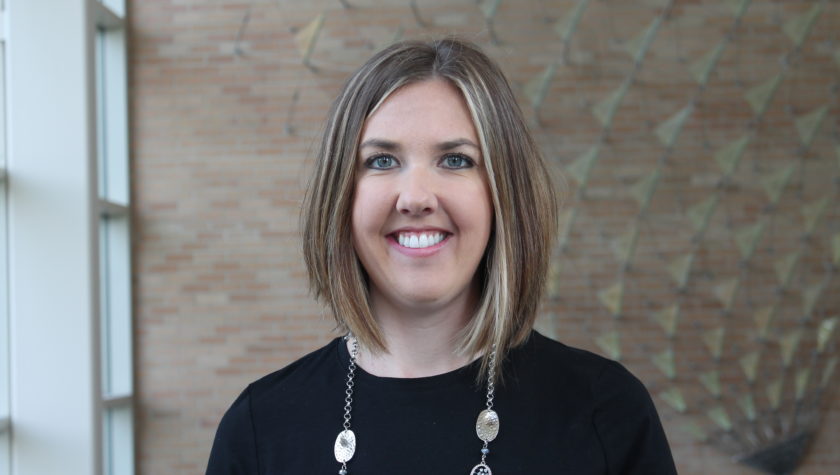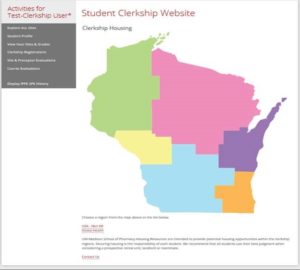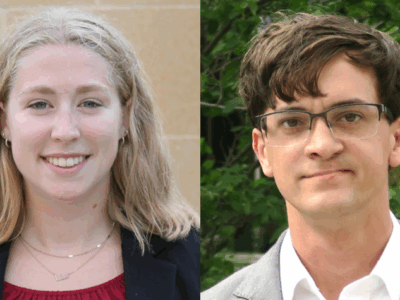
10
September

Apartment hunting is stressful—it’s even more stressful when you’re trying to secure reasonably priced accommodations for only days or weeks at a time.
Starting in their first year, students in the PharmD program participate in two types of pharmacy practice experiences: Introductory Pharmacy Practice Experiences (IPPEs) for a total of 304 hours within their first three years of pharmacy school, and then their entire fourth year is devoted to eight six-week clerkships or Advanced Pharmacy Practice Experiences (APPEs), which can take students all around the state of Wisconsin and beyond.
“Students rely on family, friends, Craigslist, Airbnb, Facebook, etc., to find housing,” says Maren VanMieghem, a fourth-year PharmD student. “But these options really don’t guarantee safe, stable, reliable housing. Not many leases or sublessors are looking to rent in six-week blocks.”
Finding housing to suit that schedule can be a time-consuming and burdensome challenge, and at most pharmacy schools, students are left completely on their own to navigate it. The University of Wisconsin–Madison School of Pharmacy created a new resource for the experiential education program to increase PharmD student support and enhance their student experience: a housing coordinator, Amanda Watter, dedicated to seeking out housing options near rotation sites on behalf of student pharmacists.
“The UW–Madison School of Pharmacy is fully devoted to providing our students with every opportunity to succeed,” says Mara Kieser, professor in Pharmacy Practice and assistant dean of experiential education. “By adding a housing coordinator—an extremely unique advantage of our PharmD program—we’re giving our student pharmacists more time to focus on learning.”

The new housing support will start in the 2018-19 school year, and Watter has been diligently collecting feedback, identifying housing solutions, and visiting sites in the School’s five clerkship regions: Madison, Milwaukee, La Crosse, Green Bay, Eau Claire, and Wausau. Many students make Madison a first choice when applying for APPE rotations because of the housing question, VanMieghem says. But with the new resource, perhaps more students will opt for the more distant options in pursuit of a new experience.
Watter surveyed graduating fourth-year PharmD students about their experiences with housing: What was frustrating about the search? What are important features of housing? What resources would be helpful?
Students responded with several suggestions, including housing options with short-term leases, and lists of popular options where previous PharmD students stayed during their rotations.
“Finding short-term housing is an additional cost and stress factor for students,” says Watter. “I am excited that we can offer this support to help ensure PharmD students have positive experiences and can get the most out of their education.”
Beginning in Fall 2018, students can access a database of housing information online, and Watter will also be creating a podcast with housing search tips (available on the students’ clerkship webpage after September 17). She also will meet with the third-year PharmD class in advance of their APPE rotations, and hold office hours for additional assistance.
“I think that if the stress of housing is lessened, it will take the anxiety and uncertainty away from students who are placed in the non-college-town hubs where temporary housing is hard to come by,” says VanMieghem.
“By adding a housing coordinator—an extremely unique advantage of our PharmD program—we’re giving our student pharmacists more time to focus on learning.” –Mara Kieser
Students will still have to choose, secure, and pay for their own housing, but having the best housing options available to them will make the search less overwhelming for students.
Moving forward, Watter is also hoping to encourage pharmacy students to take advantage of another important resource: preceptors. “Hopefully our students will start conversations with preceptors, who might have deeper insights into the local housing market, which could help us expand our library,” says Watter.
Learn more about recent innovations in the PharmD program, including a residency-track APPE and a new PharmD option focused on pharmacy operations and technology management.




